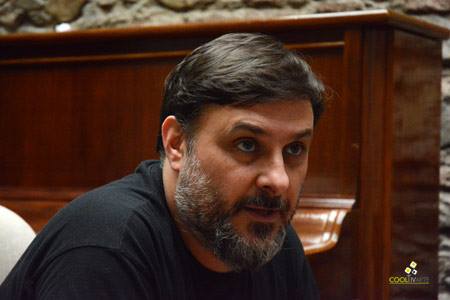(You can read this post in English here)
Luego de marcar una profunda huella con El Peyote Asesino y en paralelo a sus colaboraciones con Bajofondo, Fernando Santullo se adentra en su carrera solista con “El Mar Sin Miedo”. El disco será presentado en La Trastienda este año, y el músico integra también la comitiva que representa a Uruguay en el Festival SXSW.
Comparto la entrevista que Santullo tuvo la gentileza de concederme previo a todas estas actividades.
Un riesgo que enfrenta todo músico asociado a una banda con renombre es que su atractivo central pase a ser periférico al operar en solitario, y que su público no sea más que un grupo de personas que lo escucha por inercia.
Tu primer disco de estudio explicitaba tu vínculo más fuerte en aquel entonces ya desde el título: “Bajofondo Presenta Santullo”. Luego hubo una presentación muy contundente en vivo, y el nombre del espectáculo tenía una interesante referencia temporal: “Canciones Del Futuro Reciente”. Y ahora llega este nuevo disco, y por primera vez el título me transmite algo distinto. Y eso es libertad, entendida como la independencia de aquello que suele ser lo más oneroso para las personas: nuestro propio pasado.
¿Qué reflexión te merece esta lectura?
Bueno, yo creo que libertad tuve en cada disco que hice. Claro, cuando sos parte de una banda tenés una negociación mucho más amplia con tus compañeros. Pero también negocias cuando trabajas en solitario: con tu productor, con el sello, etc. La clave para mí es no entender negociación como pelea o “transar”. Esa es una mirada que se usa bastante cuando se habla de música y, según mi experiencia personal, no es muy realista. Siempre está en uno hasta donde se llega en esa negociación y si no querés negociar con nadie, pues haces tu disco solo y lo distribuís solo, etc. No es mi estilo de laburo ese. Quizá recientemente en la composición trabajo más solo, pero después eso está bueno que se amplíe, que recibas otras miradas. Todo es más rico cuando se vuelve colectivo. Continue reading

